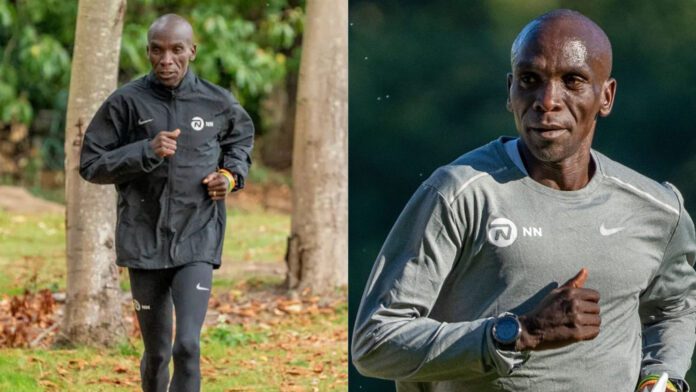Eliud Kipchoge is easily regarded by many as one of the greatest marathon runners in history. The legendary athlete owes his success over the years to his disciplined lifestyle.
Motivational experts insist that no advanced technology or nutrition plan can make you excel without dedication and passion. Kipchoge’s success is courtesy of his consistency and commitment to refining his skills every single day.
“Athletics is not so much about the legs. It’s about the heart and mind,” he said in a past interview with BBC
From a young age when he was born in Kapsisiywa, Nandi County, Kipchoge has always been training as a young boy by running to and from school daily. Furthermore, he would make additional trips by moving around 40km on bike trips collecting and selling milk to farmers.
The early jumpstart to his career has seen Kipchoge rack up quite an impressive number of achievements in the track, most notably breaking the marathon World Record.
Nothing came easy without consistently performing repeated actions. Having a simple daily routine is what enables Kipchoge focus on being the best marathon runner in the world.
In a recent interview with Citizen TV, Kipchoge shared what his daily routine looks like. He shared that he trains thrice a day for six days and only once in the morning on Sundays.
He stated that he wakes up at 5:40 am daily and starts his training 30 minutes later. The session lasts for one and a half hours.
“I wake up at 5:40 am, 6:10 am I am on the road training for one and a half hours, come back have breakfast wait for another two hours for exercises,” he said in an interview.
After the morning run, he takes lunch before the evening run and then goes to bed later.
“After morning run, I have lunch, then wait for the evening run and after the evening run, I prepare myself to have dinner and then go to bed,” added Kipchoge.
The strict training regimen started 6 weeks ago after the Paris Olympics run in August 10 which left the legend unable to complete his race in what was termed his ‘worst marathon’. He used the off-training period to reflect and adjust his future accordingly.
“I have resumed training for the last three weeks, but I’m taking it very slowly. I want to peak slowly, then try to move on slowly,” he said in the exclusive interview with Olympics.com in October.
“I had to take time off to adjust. To see what’s going on. Just pick up again and move on. It was tough. But I think I am going on well.”
Eliud Kipchoge profile: Career, business ventures and charity
He shared that his passion for sports and the inspiration he brings to communities worldwide are what drive him forward.
“You actually step into one of the cities, and you’ll meet people who tell you that you inspired them two years ago, and that’s what makes me wake up early in the morning and go for a run,” the marathoner said.
He further noted that sports should be considered just as important as education, stating that the pair teach on hard work, resilience, values and morals in sports.
“I want to urge everybody that talent alone cannot take you places but you need to have talent plus education,” he said.
“Education and sports go hand in hand and if you want to go far in sports, education must be your right hand and if you want to go far in education sports must be there because it makes your mind work in a proper way.”









